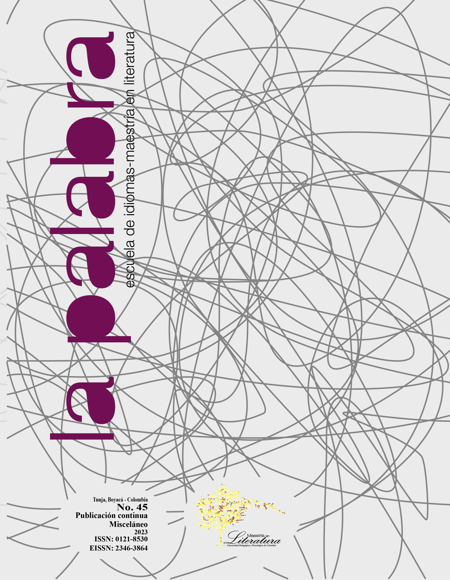Lota España: Unpublished Manuscripts of Dolores González Pérez, a Writer Forgotten by Patriarchal Criticism and Historiography

Abstract
The purpose of this article is to present and to rescue the figure and work of the Andalusian writer Dolores González Pérez, also known as Lota España, whose unpublished texts and manuscripts have recently been found. In order to carry out an accurate exegesis, we will adopt the perspective of feminist criticism and hermeneutics, which will allow us to present the author and engaged into her personal and storyworld, through a corpus composed of more than 3000 texts of undoubted literary quality, including poetry, novels, short stories, essays, literary criticism and reviews, journalistic and opinion articles, etc. In addition, we will analyze some of the most significant contradictions around the author and her works, and how they influenced her literary production, and caused, in a decisive way, her writings to be forgotten and ignored by the patriarchal literary canon.
Keywords
Lota España, Dolores González Pérez, feminist criticism, forgotten women writers, patriarchal criticism
Author Biography
Dolores Vela García
Researcher, PhD candidate, Department of Spanish and Latin American Literature, Universidad de Sevilla
References
- Ayala, Francisco. “Presencia y ausencia del autor”. Teoría de la novela. Antología de textos del siglo XX. Crítica, 1996. Impreso. pags.192-196.
- Beauvoir, Simone. El Segundo Sexo. Cátedra, 1998. Impreso.
- Domínguez Caparrós, José. Teoría de la Literatura. Editorial Centro de Estudios Ramón Areces, 2002. Impreso.
- Fajardo Correa, Jorge Rubén. Relaciones humanas y autodesarrollo. Editorial Seguridad y Defensa, 2016. eBook.
- Foucault, Michel. La arqueología del saber. Siglo XXI Editores, 1990. Impreso.
- Fuertes, Gloria y Jorge de Cascante. El libro de Gloria Fuertes. Blackie Books, 2021. Impreso.
- Fuster García, Francisco. “Las memorias de Carmen Baroja: una lectura en clave familiar”. Bulletin of Spanish Studies, 2017. Web. 16 de agosto, 2022. Academia.edu. Vol. 94, nº 9, págs. 1557-1573. DOI: https://doi.org/10.1080/14753820.2017.1402538
- Guerra, Lucía. Mujer y escritura: fundamentos teóricos de la crítica feminista. Editorial Cuarto Propio, 2004. eBook. .
- González Pérez, Dolores. La voz del terruño. Miguel Albero Editor, sin fecha. Impreso.
- ---. Notas perdidas. Librería y topografía católica, 1915. Impreso.
- Gutiérrez Navas, María Dolores. Lota España. Poesía y prosa de una malagueña olvidada. AEDILE, 2004. Impreso.
- Kirkpatrick, Susan. Las Románticas. Escritoras y subjetividad en España, 1835-1850. Cátedra, 1991. Impreso.
- Lanser, Susan S. “La posibilidad de una narratología feminista”. Teoría de la novela. Antología de textos del siglo XX. Crítica, 1996. Impreso.
- Martín, Matínez. Vivir de la pluma: la profesionalización del escritor, 1836-1936. Madrid, Marcial Pons Ediciones de Historia, 2006. eBook
- Moreno Lago, Eva María, Coord. Mujeres y márgenes, márgenes y mujeres. Benilde, 2016. Impreso.
- García, Muriel. “Su historia es la que escribo y en mi vientre se inicia. La libertad femenina en la poesía española del Siglo XX”. Mujeres y márgenes, márgenes y mujeres. Coordinado por Eva María Moreno Lago, Benilde, 2016, pp. 158-160. Impreso.
- Payeras Grau, María. Espejos de palabra. La voz secreta de la mujer en la poesía española de posguerra (1939-1959). Universidad Nacional de Educación a Distancia, 2009. Impreso.
- Suárez La Fuente, María Socorro. “La capacidad escondida, la inteligencia soterrada”. Mujeres y márgenes, márgenes y mujeres. Coordinado por Eva María Moreno Lago, Benilde, 2017, pp. 134-141. Impreso.
- Wolf, Virginia. A Room of One’s Own. Penguin Books, 2004. Impreso
